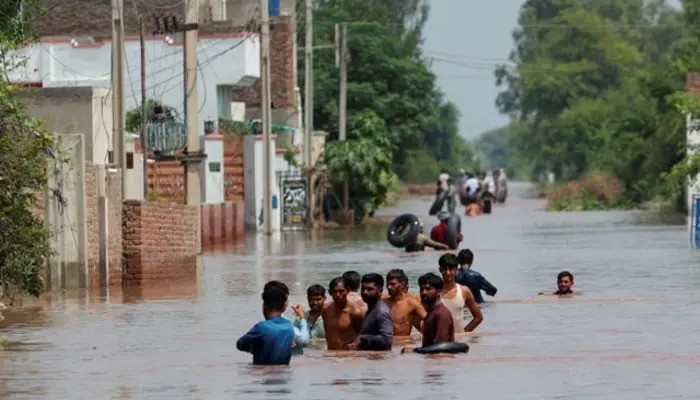The Election Commission of Pakistan (ECP) has postponed Punjab by-elections due to devastating floods that have crippled infrastructure and displaced millions. The decision, taken in light of the ongoing flood crisis in Punjab, highlights the severe challenges that have disrupted not only daily life but also the province’s political processes.
Floods Force Election Delay
On September 4, the ECP announced that polling in four National Assembly (NA) and four Provincial Assembly (PA) constituencies would be delayed. The commission explained that holding elections during the crisis would compromise both voter participation and the security of the process.
The constituencies affected include NA-66 Wazirabad, NA-96 Faisalabad, NA-129 Lahore, and NA-143 Sahiwal, along with PP-73 Sargodha, PP-87 Mianwali, PP-98 Faisalabad, and PP-203 Sahiwal.
Infrastructure in Ruins
The floods have left behind widespread destruction. Roads, bridges, railway lines, and electricity poles lie damaged across Punjab. Mobile networks are down in many areas due to collapsed cellular towers.
Government schools and other buildings designated as polling stations have either been submerged or severely damaged. Warehouses earmarked for election materials are also unusable. The ECP concluded that these conditions made it impossible to conduct fair and secure elections.
Relief Operations Stretch Authorities
Civil administration and law enforcement agencies are fully engaged in flood relief operations. Thousands of officials who would normally serve as polling staff are currently rescuing stranded families, distributing food, and managing shelters.
Read: Earthquake in Pakistan Sparks Panic as Tremors Hit Major Cities
Several District Returning Officers informed the ECP about the unavailability of staff and requested replacements from other districts. However, the scale of the crisis left few options. The provincial government itself formally requested the postponement, citing the overwhelming focus on saving lives and property.
Constitutional Obligation and Voter Rights
The ECP stressed its responsibility to conduct elections in secure conditions. It argued that attempting to hold polls in the current environment would disenfranchise voters and undermine electoral integrity.
“The decision to postpone is in the public interest,” the commission said, adding that polling will resume once the situation stabilizes. This assurance aimed to ease concerns among political parties and voters about the delay.
Human Toll of the Disaster
Punjab is experiencing one of its worst flood emergencies in recent history. Officials confirmed that at least 46 people have died so far, while more than 3.7 million have been affected. Villages across the province remain submerged as monsoon rains and water releases from India worsen the crisis.
Nearly 1.8 million people have been evacuated to safer areas. Relief camps have been set up, but resources remain stretched as the displaced population grows. In total, more than 3,900 villages have been inundated since the flooding began.
Multan Under Threat
Authorities warned that the historic city of Multan faces a serious flood threat. To save the city, they are considering breaching the Chenab riverbank to divert water into nearby rural areas. While this measure could protect Multan, it may put surrounding villages at greater risk.
At Shershah Bridge in Multan, rising water levels forced officials to suspend traffic. Chief Minister Maryam Nawaz personally visited Head Muhammad Wala, a site identified as a major challenge in the coming days. She reviewed emergency measures to prevent further damage.
Rivers Swell Beyond Control
The latest measurements show the Chenab River carrying 530,000 cusecs of water at Qadirabad Headworks and 500,000 cusecs at Chiniot. Trimmu reported 253,000 cusecs.
Other rivers are also swelling. The Ravi recorded 98,000 cusecs at Siphon. The Sutlej carried 319,295 cusecs at GS Wala and 169,032 cusecs at Panjnad. These dangerously high levels continue to strain flood defenses across the province.
Political and Public Response
The postponement of the by-elections has stirred debate in political circles. Some parties argue that the delay was unavoidable given the scale of the disaster, while others fear it may affect voter enthusiasm when polls are eventually held.
Citizens, however, appear more focused on survival than politics. Families in flood-hit areas continue to plead for food, medicine, and shelter. Many express anger at decades of poor planning and weak infrastructure that have left them vulnerable to floods year after year.
Administrative Accountability
The crisis has once again raised questions about long-term planning. Experts argue that unchecked construction, weak river management, and lack of flood-control measures have worsened the disaster. The government now faces calls to improve flood resilience and invest in stronger infrastructure to prevent future tragedies.
The ECP’s decision shows how natural disasters can disrupt even fundamental democratic processes. With millions displaced, the priority remains relief and rehabilitation. Once the situation improves, political processes will resume.
What Lies Ahead
The floods in Punjab have created an extraordinary challenge. The election delay underlines the gravity of the disaster and the urgent need to prioritize human safety over politics. Relief operations continue, but with water levels still rising in major rivers, the situation remains critical.
For now, the people of Punjab wait for the waters to recede, for aid to reach them, and for stability to return so that both daily life and the democratic process can resume.
Follow us on Instagram, YouTube, Facebook,, X and TikTok for latest updates
